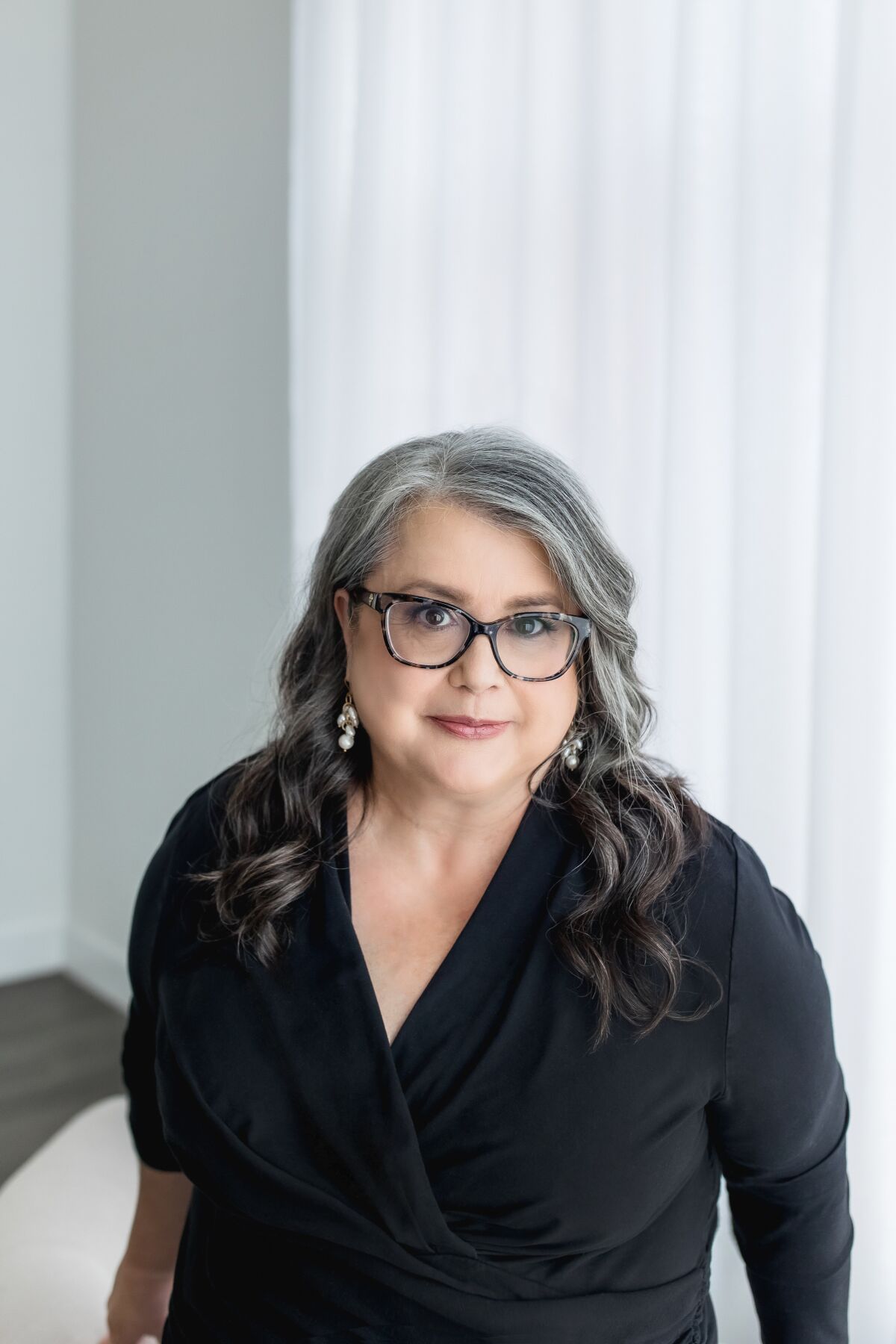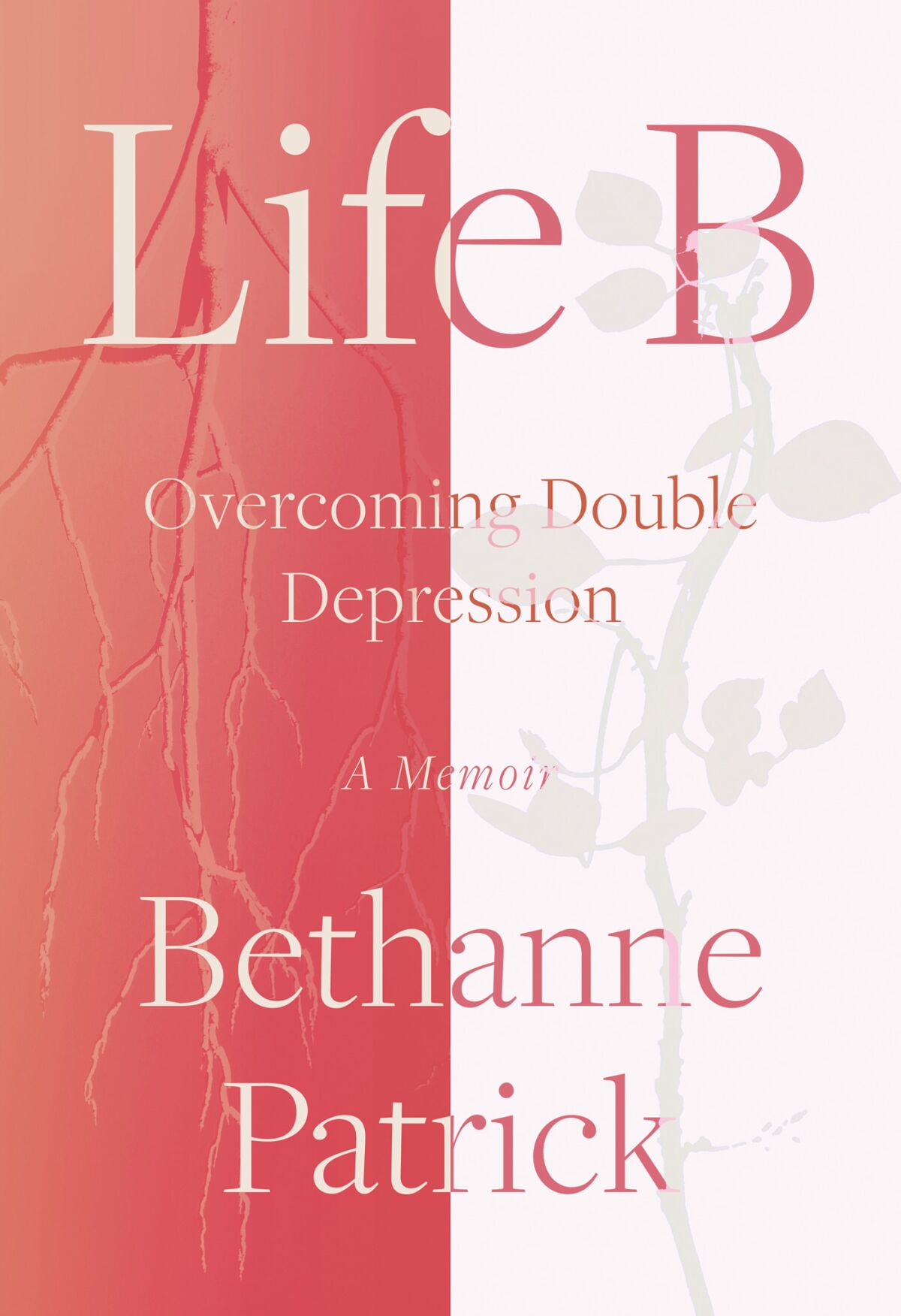
Bethanne Patrick unveils regrets and a midlife diagnosis in “Life B: Overcoming Double Depression.”
(Michelle Lindsay McAfee/Michelle Lindsay Photography)
Review
Life B: Overcoming Double Depression
By Bethanne Patrick
Counterpoint: 208 pages, $26
If you buy books linked on our site, The Times may earn a commission from Bookshop.org, whose fees support independent bookstores.
There were many moments in Bethanne Patrick’s memoir, “Life B: Overcoming Double Depression,” when I wanted to grab its author by the shoulders and shake her. Don’t you dare turn down that job in publishing to move to Germany with your military officer husband. Don’t you dare have that second kid when what you really want is a PhD!
So it’s no small feat when, in the book’s opening scene, Patrick states her needs clearly and concisely. As her husband drives her to a psychiatric hospital at her request, he says: “You know you don’t need this, right, Beth? We can just go home.” (This is the same husband who, when Patrick found a psychiatrist she liked, was infuriated by the monthly bill.) “Thanks,” Patrick responds from the backseat of the car. “But I need to go.”
“Life B” expertly captures the nefarious ways depression causes us to lose sight of the most important thing in life: ourselves. Patrick spent years feeling “flawed, broken, weak, fragile, lazy.” She beats herself up about not being there for her daughters, about being “a depressed mother.” She regrets decisions she made because she believed she couldn’t do life on her own. “Life B” asks, terrifyingly, “What does it mean to be ill and not know it?”
There are some misguided statements in the memoir, such as this one about Patrick’s childhood: “For me, the combination of a genetic tendency toward depression combined with a familial expectation of excellence might as well have been regular beatings.” Initially, I wondered why this couldn’t have been a personal essay rather than a memoir. But the more I read, the more I realized how important Patrick’s message is — we should take clinical depression seriously not only as a society but as individuals, in our own lives.
The pressures on women to subsume their ambitions to patriarchal expectations are more familiar than the particular condition that drove Patrick to buckle under them. As her doctor explains, “double depression is a form of bipolar syndrome, but instead of bouncing between depression and mania, the person starts out as depressed and gets . . . more depressed.”

“Life B” is the life Patrick lives now, after a later-in-life diagnosis and a regimen of medication. Had she been diagnosed earlier, it might have always been Life B — “clear, sharp, delineated” — like the perfect lens picked out in an optometrist’s office. That clarity could have allowed Patrick to articulate to her husband, and more importantly to herself, what she wanted: “I was following life’s instructions for overachievers, attempting to gain a gold star in parenthood even though what I really wanted was the floppy cap of a newly minted PhD.”
Patrick, a Times contributor, writes with fearsome honesty about the horrors of living a life that is not your own. “I was losing my identity before I even figured out who I was.” She tells us she has gained eighty pounds since her wedding day in 1985: “Every single pound I’ve gained in the last thirty-five years equals an idea I didn’t pursue, pages I didn’t write, hours I didn’t give to my creative work and therefore resented with my whole heart.” At this point, I didn’t want to shake Patrick as much as I wanted to embrace her.
Here’s how she justifies placing the needs of her husband (whom she gives a pseudonym) at the top of the family: “Adam’s job will always be the most important, the one that supported our family, the one that still supports me now that our daughters are adults with their own jobs and health insurance. Adam’s job carries the health insurance that allows me to receive my medications for a very reasonable cost, that gives me the freedom to work as a writer, because while I have a career, I don’t make a living. Why wouldn’t I want to disappear?”
Depression still carries the stigma of not being a “real sickness,” and Patrick is a woman, a wife and a mother. “Isn’t a mother supposed to be the most important person in a child’s life? The most important parent in a child’s life?” The answer is that both parents are important to a child’s life. But depression makes her into a failure because she’s trying to fulfill someone else’s idea of what a mother should be.
Patrick writes of emerging from a depressive cycle as an experience akin to getting sober: “When you can suddenly see things clearly after years of blur and astigmatism, you may love some details and other details may set your teeth on edge.” She adds, however, that she still loves her husband deeply, and she’s talking to her daughters about reframing their childhoods with the knowledge of her illness.
“Life B” is obviously a huge part of Patrick’s healing process, which ultimately makes this memoir a compelling read — not because her illness is so unusual but because her experience of it, her fight to get back to herself and her desires, is so frustratingly common, particularly for women of middle age who have spent their lives putting others first.
In living her Life B she is creating something new out of herself, one intentional decision at a time: “Let’s go out for dinner! Also, let’s cook dinner, it will be fun. Yes, I can make it. Also, no, I’m sorry, that doesn’t work for me. Again and again I was making choices that were new to me. Call it rehab of the psyche.” These thoughts might feel like baby steps, but they represent one giant leap.
Suicide prevention and crisis counseling resources
If you or someone you know is struggling with suicidal thoughts, seek help from a professional and call 9-8-8. The United States’ first nationwide three-digit mental health crisis hotline 988 will connect callers with trained mental health counselors. Text “HOME” to 741741 in the U.S. and Canada to reach the Crisis Text Line.
Ferri is the owner of Womb House Books and the author, most recently, of “Silent Cities San Francisco.”
For all the latest Entertainment News Click Here
For the latest news and updates, follow us on Google News.
